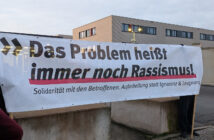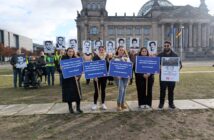Compared to the previous day of the trial June 12th was as unspectacular as you would normally expect: The interrogation of Carsten S. continued first by Judge Götzl and later the Federal Prosecutor’s had a chance to question him. Several statements from the testimony scrutinized as they attempted to clarify statements from yesterday. The defendant was reproached for statements he had made when he was interrogated by the police and the Federal Prosecutors.
The session began with a variety of delays, because one of the accused was indisposed. In all likelihood, it was probably Beate Zschäpe. The fact that her attorney was hanging around in the area in which the accused is held before court begins and during the breaks, speaks in favor of this.
The accused entered the waiting are and shortly thereafter, the courtroom at 10.50. After roll call the presiding judge Manfred Gӧtzl announced that the investigation into the Carsten S’ attack, which had been mentioned yesterday, had been undertaken, in order to collect together the documents and complete the questioning. At this point, the questioning of the accused Carsten S continued. Gӧtzl interrogated him intensely about all of the most important comments made yesterday, especially with respect to the story he told about a flashlight, which Mundlos and Bӧhnhardt might have deposited in Nürnberg.
Carsten S claimed that he had cleared everything up during the trial yesterday. One of the reasons he held many things back was because he didn’t want the kids of Ralf Wohlleben to have their father taken from them, which he now recognizes as being idiotic. Gӧtzl then asked once again about the situation surrounding the exchange of weapons in Chemnitz. Both of them had spoken of a flashlight, which they put in a store in Nürnberg, but which didn’t work. Which of the two had actually said this, he wasn’t sure of. As Zschäpe came into court, he was greeted with a “friendly hello”, as he had not seen them in a while. That must have been, “that thing on the authority of the attorney”. He no longer knew how Zschäpe had signed the decree, but just that it had come to that. Gӧtzl wants to know what is said in the presence of Zschäpe. S answered, “I know just that sort of question: How’s it going? In any event, the mood was pleasant.” They left shortly thereafter himself and the Uwe’s, but he couldn’t remember the good bye’s exactly. Gӧtzl wants to know if he had considered not to hand over the weapon in consideration of the fact that both of them had already told him that they were armed. He was irritated and felt as if he had been punked, but he did it nonetheless. He said that he had made sense of giving them the weapon by thinking about it, “in terms of a bank robbery”. When questioned about the actual chain of events, he explained that Bӧhnhardt then played with S’ cellular telephone, leaving his fingerprints behind, which he then washed away. Then they started talking about the flashlight. This must have been the case, because Zschäpe then joined them and the Uwe’s allegedly said “Psst”. He interpreted this as if Zschäpe wasn’t supposed to hear anything
With respect to the comments made by the Uwe’s concerning the flashlight, he said that he thought about them a day or two later while laying in bed, but forgot about them pretty quickly thereafter. He also hadn’t investigated into whether there had been a result, which corresponded to this description. He had pushed it all away and it had also not had an influence on his decision to hand over the weapon.
Gӧtzl then asked if he could explain to himself why he had been trusted by those two but not Zschäpe. At that time, he hadn’t thought about it. He had only been told by his attorney’s earlier today that something was supposed to have happened there. “I remembered that ‘it hadn’t worked’, that they had said that, and shortly thereafter, I believe, I relaxed.” He personally doesn’t have any connections to Nuremberg. Gӧtzl then asked why he had asked himself about potentially not giving them the silencer. S answered that he had thought about it, because the silencer hadn’t been ordered, on account of the connection point of the silencer, but he then reconsidered. Gӧtlz then questioned again. S then responded, “so that they don’t stumble on any dumb ideas”. Gӧtzl responded that that was a different concern. S. responded that he didn’t think that three had it in them to do something bad and that it is “extremely difficult” to bring what he knows know in line with what he thought then. Shortly after lunch Gӧtzl asked him to speak quickly about whether there was any evidence about the sale of the weapon. He had seen two weapons with silencers and chose the one with the longer silencer. At this point attorney Heer, Zschäpe’s lawyer, intervened that S should not be questioned about evidence related to the weapon, because this still needs to be brought before the court.
He claims that the telephone conversation, in which Wohlleben is accused of having laughed when he said that those in hiding had shot someone, occurred after the handing over of the weapon, because he can remember having thought to himself, “hopefully not with the weapon.” He made sense of the laughing in the following way, “that was the sense in which it came across, I don’t know if he had said that: the idiots shot somebody.” He has a memory of something relating to a security guard and he had thought about it in terms of a bank robbery. During the money transfer he had seen money rolls. That was the connection. He had thought to himself that small bills could only have come from a bank robbery, but that he hadn’t had any further thought about it and he had also not spoken about it with Bӧhnhardt, Mundlos, Zschäpe or Wohlleben.
In response to further questioning about the telephone conversation in which Wohlleben had spoken to him while laughing was interrupted by attorney Stahl, Zschäpe’s attorney, who montioned that the judge was pursuing the same line of questioning multiple times. He motioned that he was leading the witness.
S wants to answer the question. Wohlleben introduced him to his kids and that was the last time that he had had contact with him. For a long time he had had a lot of contact with Wohlleben. With respect to the scene, it came about chronologically, he then came into contact with Christian K and then with Wohlleben and then with his JN group (among them, Steve H., Ronny A., Daniel S.).
Court adjourns 11:55, Court back in session 12:20.
After the break the main topic was once again the flashlight. Gӧtzl asked why S connected the button on the flash light with a fuse. S said that he associated it and that he added one and one together. “What is different about a flashlight and why would one put it in a store?”
Gӧtzl accused him of not being completely honest and confronted him with statements, which he had made when questioned by the police and the general attorney. He wasn’t able to account for the exact timing of the final conversation he had had with the three of them. The communications first were made via phone booths and then, after S had gotten a Prepaid card from an acquaintance, they were made via cellular phones. S then told about his parents upon being questioned in this direction. His mother had always argued against him once he entered the right wing scene, his father, although usually politically “neutral”, sometimes agreed with him. Regarding the theme of racism he said that he listened to racist music, collected signatures against any dual citizenship and that “hatred of foreigners” came up again and again in NPD meetings, but that he didn’t behave in any particular way on the issue. He couldn’t say anything about Thorsten Heise or any time potentially spent underground outside of Germany. He reported on Ronny A., who he was close friends with at the time and also on Jana A, who, at the time was with Andre K.. He also reported on the Thüringer homeland protection agency (THS), about Tino Brandt, who he thought was his boss, regarding a variety of “safety zones” of Neo-Nazi groups and named further names connected with this (Jӧrg K., Marcel E.) When the THS was in the process of being banned, the order was given for the NPD to step in.
When questioned about Wohlleben, he confirmed, that he knew that he was addicted to gambling. Wohlleben didn’t tell him this himself, however. According to his memory, Wohlleben had been against accomplishing “political things” through violence. The brawls, which he had reported about and which Wohlleben had partaken in, had been exceptions.
1:00 Lunch break. 2:20 court back in session.
S reported that he could remember speaking about those who disappeared with three people in the scene. He had said that the three were doing well. He had been boasting and he couldn’t remember who the people were whom he spoke about. He had asked Steve H. if he could help him plan how to steal the motorcycle for those who had disappeared. He said that he had not told Steve H. what the motorcycle was going to be for and H. had not helped.
The next theme discussed was the “Jena fraternity”. S claimed that the concept of the “Jena fraternity” didn’t play a role in the scene while he was there. “When I entered, Christian K had three letters, national resistance Jena, or something like that. And somehow that turned into the “Thüringer homeland protection agency (THS). He heard about the “Jena fraternity” for the first time when he gave Wohlleben the flag, which he received when they broke into Zschäpe’s apartment. At that time Wohlleben said that it was the “old fraternity flag”. During one interrogation, Gӧtzl claimed that he had spoken about a “clique surrounding Wohlleben”, which called itself by that name. S responded that he couldn’t explain nor remember saying that. A conversation then developed between Gӧtzl and Zschäpe’s defense attorney regarding the length of time, according to S. it was nine hours, and the length of the interrogation in which these statements were made. S was then asked to describe how the interrogation went.
When asked, S. then described that he hadn’t thought about what had happened when he was apprehended by the police. He had made it clear, however, that he wouldn’t say anything. He had continually visited classes on legal rights, taught, among others, by Mario Ralf B. He confirmed the statement that the JN group, which had somewhere between 10-15 members, was “autonomous”. He assumes, however, that what is meant by that the group wasn’t dependent upon older Neo-Nazi’s such as Wohlleben and Andre K., who were more concerned with the internet (Wohlleben) or Black Metal (K.).
And with that the questioning of the court was closed. After the break, at 3:50, the federal prosecutors began with their questioning. The leading attorney with the BGH Weingarten asked for S. how he would classify himself politically. S. did designate himself a “national socialist”. But Weingarten was interested in if and how he related his own self-description to historical National Socialism and what he thought about the Holocaust. S. answered elusively. Weingarten: “Mr. S., speak frankly”. S answered that he had disavowed the Holocaust, saying, “it was easier to exist if one did”. Weingarten then asked if S. considered himself to be a member of a “superior race”, to which S. responded no. Finally, Weingarten asked multiple times, whether S. organized his dislike of foreigners hierarchically, if, for example, he hated Swedes who lived in Germany as much as Turks. It took awhile until S. admitted that the skin-color was important.
Weingarten also asked about the money for the weapon. There are differences between S’ previous testimony and what he says now. Here, S. said that he received money for the weapon he transferred in Chemnitz. In an investigation he had previously said that he received money in Chemnitz, “for the telephone care or if something comes up”. S. responded that he received money for the weapon, but doesn’t know, if he gave some to Wholleben or kept it all for himself. The money he used to buy the weapon from Andreas S., however, he had defiantly received from Wohlleben. The handing over of the weapon and money had been for him “just a fact”. In response to the follow up question whether the money had been seen as replacement for the cost of the weapon, S. said yes.
Weingarten then asked him to justify his extended silence regarding the flashlight. S. then justified himself by saying that he didn’t want Wohlleben’s kids taken away from him. To the question of whether he knew where Wohlleben was when he was interrogated for the first time, Wohlleben answered yes, in jail. And in response to whether he remembered what role he had claimed that Wohlleben had played with respect to the weapon at that time, S. again said yes. Weingarten then said, “and today you say that you don’t want to cause Wohlleben any problems. I don’t understand that.” S. answered that he knows that it isn’t rational and that it is idiotic. Weingarten said that he doesn’t understand S.’s confessional behavior since he was arrested. Since he now admitted playing a functional role, whether there was anything more to it than what has been said. This S. denied.
Gӧtzl suggested stopping the testimony at this point. He said that he intends to allow the co-plaintiff’s prosecution and the defense to question first. RA Klemke, the attorney for Wohlleben, then motioned to allow the defense to question before the accessory prosecution. He justified this motion by relating it to the European Convention for Human Rights. He argued that the defense has a right to a confrontational interrogation of witnesses. Co-defendant’s such as Carsten S., should also be considered as witnesses, since S. is the primary witness against his client. Because of the number of joint plaintiffs and their representatives, the right to a confrontational interrogation is no longer available if the defense is not allowed to interrogate prior to the joint plaintiffs. Federal prosecutor Diemer contradicted him. From the joint plaintiff’s there is both rejection, but also agreement to this proposal.
At 4:40 Gӧtzl adjourned court for the day.
The representatives of the joint plaintiff’s Peer Stolle and Scharmer gave their take on the day in their news release for the day 6/12/2013.
Attorney Stolle spoke of the suspicion of a further attack of the NSU in 1999:
“It is important that everybody involved in the trial receives knowledge of a number of cases under investigation for which, according to the BKA and BAW, the NSU are possibly responsible. Carsten S.’ statement that the NSU was probably involved in the concealed bombing attack with the flashlight, should be reason enough to call for a full reinvestigation of previous cases. The BAW should now take responsibility for clearing up this situation.”
Aattorney Scharmer commented on the testimony of Carsten S.:
“I have the impression that Carsten S. was only partially telling the truth and certainly not opening up about many facts that relate to his case. If this happened intentionally or because of some repressed factor, is difficult to tell at this time. He certainly seemed to be downplaying his the part he played in helping with the murders.
The statements of Carsten S. further imply Zschäpe and Wohlleben directly as well as the accused Holger G. and Andre E. more indirectly. Apparently Wohlleben and Mundlos at least were much less of a secret than previously thought. They unabashedly told a much younger accomplice of Wohlleben’s of what had to be an unknown fact for there, namely that they were armed with an automatic pistol. They boasted of their status as persons in hiding and their role in further attacks in Nuremberg. Andre E. and Holger G. also stood in a much closer relationship, such that it would be illogical to think that they knew less than Carsten S. The Uwe’s supposed order to be silent in front of Zschäpe doesn’t free her from implication…the fact that she didn’t hear people who were practically unknown to her boasting about her accomplices does not mean that she didn’t know anything of the deeds herself. „


